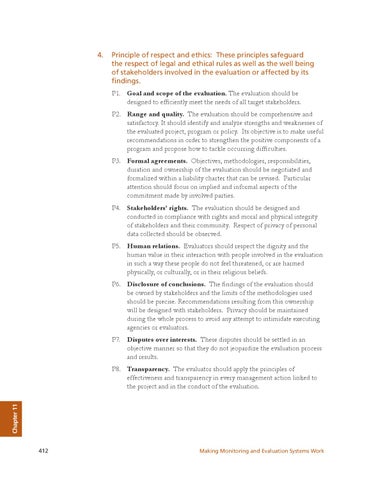4.
Principle of respect and ethics: These principles safeguard the respect of legal and ethical rules as well as the well being of stakeholders involved in the evaluation or affected by its findings. P1. Goal and scope of the evaluation. The evaluation should be designed to efficiently meet the needs of all target stakeholders. P2. Range and quality. The evaluation should be comprehensive and satisfactory. It should identify and analyze strengths and weaknesses of the evaluated project, program or policy. Its objective is to make useful recommendations in order to strengthen the positive components of a program and propose how to tackle occurring difficulties. P3. Formal agreements. Objectives, methodologies, responsibilities, duration and ownership of the evaluation should be negotiated and formalized within a liability charter that can be revised. Particular attention should focus on implied and informal aspects of the commitment made by involved parties. P4. Stakeholders’ rights. The evaluation should be designed and conducted in compliance with rights and moral and physical integrity of stakeholders and their community. Respect of privacy of personal data collected should be observed. P5. Human relations. Evaluators should respect the dignity and the human value in their interaction with people involved in the evaluation in such a way these people do not feel threatened, or are harmed physically, or culturally, or in their religious beliefs. P6. Disclosure of conclusions. The findings of the evaluation should be owned by stakeholders and the limits of the methodologies used should be precise. Recommendations resulting from this ownership will be designed with stakeholders. Privacy should be maintained during the whole process to avoid any attempt to intimidate executing agencies or evaluators. P7. Disputes over interests. These disputes should be settled in an objective manner so that they do not jeopardize the evaluation process and results.
Chapter 11
P8. Transparency. The evaluator should apply the principles of effectiveness and transparency in every management action linked to the project and in the conduct of the evaluation.
412
Making Monitoring and Evaluation Systems Work
